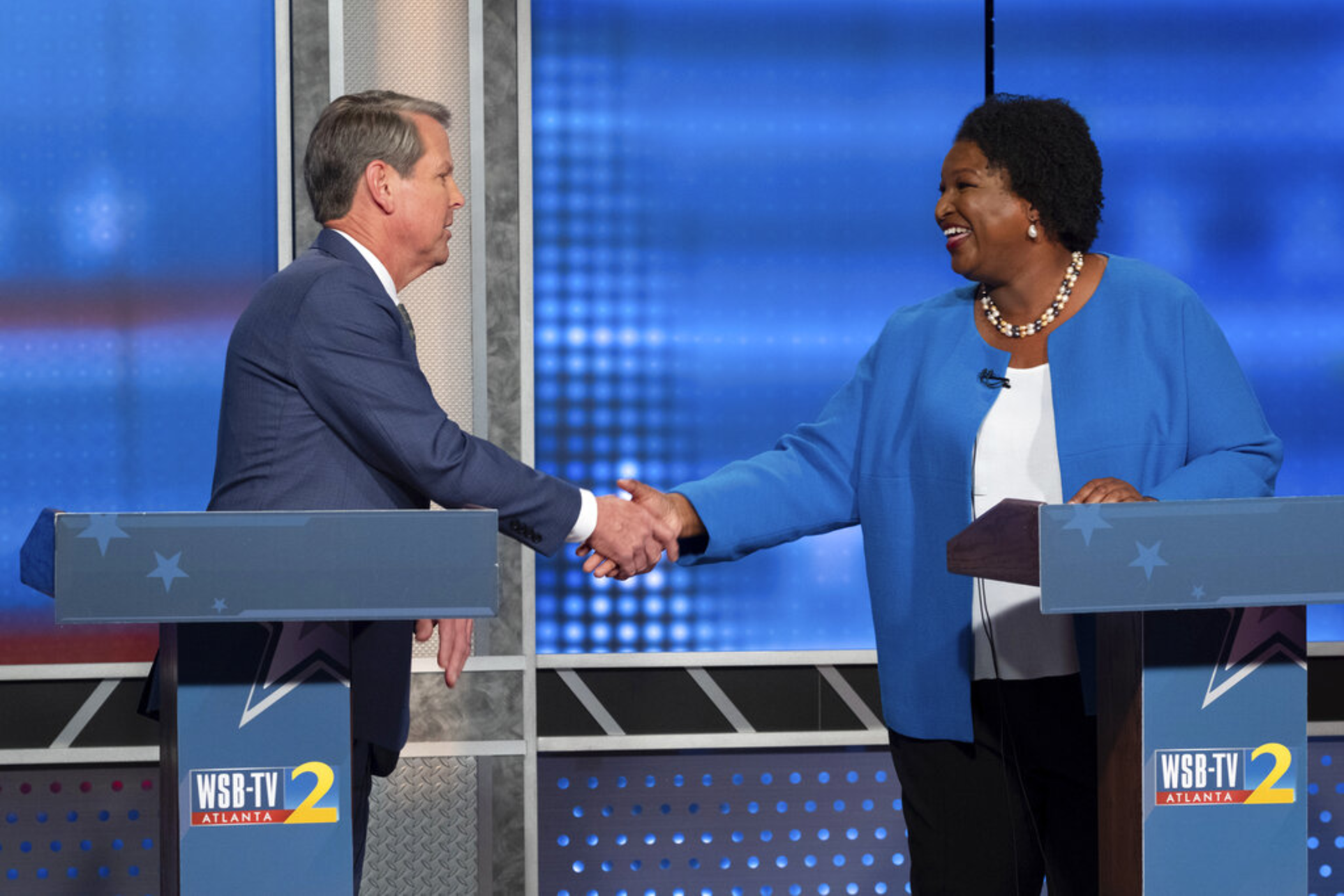Section Branding
Header Content
Kemp, Abrams face off in final debate before election
Primary Content
Republican Gov. Brian Kemp and his opponent Democrat Stacey Abrams shared a stage Sunday night for the last time before voters cast crucial ballots on Election Day in a little over a week.
During an hourlong debate hosted by WSB-TV Channel 2, the pair gave their final pitches to Georgians ahead of the high-stakes midterm — in which over 1.6 million votes have already been cast during the early voting period.
The most prominent topics remained similar to previous debates: questions about inflation, abortion and crime dominated the conversation. Here’s a breakdown on what Kemp and Abrams had to say about top issues during the debate.
Inflation
The state of the economy in Georgia has stayed front and center of both candidates’ campaigns throughout the Kemp-Abrams rematch.
Kemp has consistently touted Georgia’s economic resilience despite the impact of the COVID-19 and credits his decisions to ease restrictions on businesses, despite receiving harsh criticism at the time.
The Republican pointed to his record of passing a tax refund for Georgians last legislative session and suspending the state’s gas tax.
Americans have the Biden administration to blame for the country’s inflation woes, he said.
“Our economy has been incredibly resilient,” he said. “We've had two record years for economic development in a row, record number of investment, record number of jobs and people's salaries are going up. The problem is they're not going up fast enough to keep up with Joe Biden's inflation.”
Abrams pushed back that Georgia was given a lifeline through billions in COVID-19 pandemic relief doled out by the Biden administration. She argued that Kemp has sat on money like relief funds and Medicaid dollars that could be used to bolster state services to ease Georgian’s pocketbooks.
“The problem is that Georgia has some of the lowest wages in the nation,” she said. “And because of that, we need a governor who's going to use her power to focus on the cost that a governor can control: tackling affordable housing, which this governor has refused to do. Tackling the issue of health care costs.”
The Democrat also warned of the potential that conservative policies like loose gun restrictions and the abortion ban push businesses and events out of the state, citing the MLB’s decision last year to pull the All-Star Game and Music Midtown’s last-minute cancellation.
Abortion
The hot-button topic of abortion received more airtime Sunday night than in previous debates. After the Supreme Court decided to overturn federal abortion protections this summer, Georgia’s strict 2019 abortion law went into effect and became a focal point of statewide campaigns.
Kemp — who promised on the 2018 campaign trail to crack down on abortion access — has largely avoided the topic during his reelection bid.
The Republican said he is not interested in seeking further restrictions but declined to comment on whether or not he would sign any additional legislation that may be sent to him by the legislature.
“I'm not going to say yes or no to any specific piece of legislation without actually seeing exactly what it's doing,” he said. “It's not my desire to move the needle any further on this issue.”
Polling shows that House Bill 481, which bans most abortions around six weeks of pregnancy, is widely opposed by Peach State voters.
Abrams has used abortion as a main rallying cry to voters ahead of the election. She points to the state’s startling maternal mortality rates — particularly for Black women — and the potential for women to be investigated for miscarriages under the vague language of the law.
“It is deeply, deeply concerning to me that anyone would minimize what a woman is experiencing late in her pregnancy when she has to make a terrible decision,” she said. “That decision should not be adjudicated by men in the state legislature, but by a woman and her doctor. And that is what I will defend. And I will stand in that space and defend women with every breath in my body.”
Kemp adamantly denied that women who miscarry would face prosecution and shared a deeply personal story of a miscarraige his own family experienced that he hasn’t told before on the campaign trail.
“I have been in the doctor's office with my wife and seen two heartbeats on an ultrasound,” he said. “I've gone back a week or so later and saw one heartbeat. My wife and I both had a hard time having our first child. She miscarried. It is a tragic, traumatic situation.”
Crime and guns
Kemp has consistently touted the endorsement of over 100 sheriffs across the state during his reelection bid and linked their support to his efforts to bolster law enforcement while in office, such as an extensive crackdown on street gangs.
But Abrams has been quick to point out that while violent crime has spiked across the entire state, Kemp and state lawmakers passed legislation this past session that loosened Georgia gun requirements.
Lawmakers this session passed permitless carry legislation that did away with the license requirement for Georgians to carry a concealed handgun in public. Abrams and Democrats argue this took away one of the only background checks the state has on the books.
“We need a governor who understands that local governments need help now,” she said. “And that, yes, while street gangs are important, so is the violent crime being perpetrated by dangerous people who have access to weapons because of Brian Kemp.”
Kemp pushed back that the change simply does away red tape for Georgians who are already legally able to carry a gun.
“The law is the same as it was before constitutional carry passed,” he said. “And I've got news for you: the criminals, they don't care what the laws are. They already got the guns.”
The Republican criticized his opponent for her support of eliminating cash bail and accused her of supporting “defund the police” efforts, something she has repeatedly said is not true.
Voting rights
More than 1.6 million Georgians have already cast ballots for the midterm election during the state’s early voting period. The numbers shatter previous records for early, in-person turnout.
Republicans have used the high volume of votes to push back against claims that Senate Bill 202, the 98-page omnibus election law passed last legislative session, created additional hurdles for Georgia voters.
The elections in 2020 were upended by a wave of distrust in the outcome fueled by former President Donald Trump. In the aftermath, state lawmakers made wide changes to the state’s voting system.
When pressed, both candidates answered that they would accept the results of the 2022 election.
“In Georgia it’s easy to vote and hard to cheat, and I’m committed to keeping it that way,” Kemp said. “And I’m the one that’s been truthful and honest about this.”
But Abrams accused Kemp of discriminatory practices while serving as secretary of state and creating additional obstacles for voters through the new legislation.
She said the surge in early voting is “in spite of SB 202, not because of it.”
“SB 202 was not designed for voters,” Abrams said. “It was designed for politicians. And unfortunately for too many, it's working.”


